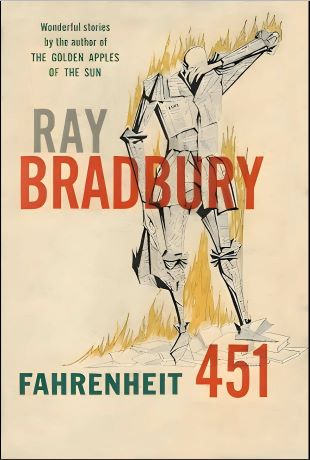Reflections on Farenheit 451
My thoughts on Ray Bradbury's novel Farenheit 451 and its parallels with life today.
Discovering the Book
About 10 days ago, I was reading an article about highschoolers on CBC.ca which mentioned the book Farenheit 451. I’d never heard of the book before so I decided to check it out on Amazon. I discovered it was about a firefighter who burned books for a living, and lived in a world where people interacted more with their television screens than each other. Does this latter part sound familiar?
 One of the many covers of Farenheit 451
One of the many covers of Farenheit 451
It made me think of today where almost everyone is constantly glued to their phones in public spaces with hardly any thought about interacting in a present way with their environment. As this thought came to me, I started to wonder how the story would go and what other parallels could be drawn with the fictional world of the book and society today. And so for $1.99, I purchased the Kindle version of the book and started reading it as time permitted. I finally completed it this morning.
Initial Impressions
The book starts off by introducing the main character Montag and his work as a firefighter which focused not on saving burning structures, but on destroying books. The fact that books were the target of such extreme measures really disturbed me as a book lover. I couldn’t fathom living in a world where books are forbidden and illegal.
I also found it disturbing how numbed, dumbed down, and shallow the society seemed, and how unquestioningly almost everyone had accepted the status quo. I was also left creeped out by how easily controlled persons in this fictional world had become, and how dangerous the state was to those who challenged or threatened the existing order. Society had come to a point where people were willing to report others for book ownership, and were quite content to watch the houses and lives of the guilty burn as a consequence of being reported.
The only ones who questioned the status quo were Clarisse McClellan, Montag’s young neighbour, who was different from all the other mindless followers Montag encountered, and the small group of resistors he became a part of at the end of the story. Clarisse’s contratrian state and knowledge of times past seems to have been the result of familial influence, and so her family can also be included among those who were not in agreement with the way things were.
Control Facilitated By Ignorance
The society in which Montag lived seems to have been placed in a trance by the interactive programs being beamed into their homes via their wall filling parlour screens. These programs kept the general populace in a state of ignorance which allowed them to be completely mind controlled, as seen when they are told to look out of their houses on the count of ten so that they could locate the fugitive Montag when he was being chased by the Hound for destruction. His crime? He had stolen and read books.
Robotic Agent of the State - The Hound
The Hound was a mechanical dog like creature which was used against those who were deemed to be criminals. It was an instrument of state persecution used to hunt and permanently silence those who challenged or contravened what the state had deemed to be necessary for a functioning society.
At the beginning of the novel, Montag had an experience with the Hound at the firehouse which made him think that it didn’t like him. His captain Beatty dismissed the idea of the Hound not liking him, but later developments in the story hint to the possibility that perhaps the captain knew that Montag wasn’t 100% loyal to the cause, and that perhaps the Hound had been programmed to reflect this.
Montag certainly didn’t help his case after he fell ill by going on a rant about books. This later culminated in a verbal match with his captain at the firehouse about the usefulness of books. It was interesting that while books outside of training manuals were forbidden, the captain was able to make references to different literature books. If reading wasn’t allowed, where did he get his knowledge? How was he able to browbeat Montag and tell him that they were a waste of time? This suggests that there may have been a deliberate attempt by the powers that be to purposely hide knowledge and keep people ignorant.
A Dumbed Down Society
When Montag was going through his awakening, he asked his wife’s friends to discuss politics. Their responses showed that society had become dumbed down to the point where critical thinking was sadly absent with judgments being made using superficial qualities. Their only criteria for selecting a leader was appearance and speech. They thought that Mr.Noble was a good choice of leader because he was tall and handsome, and that the other man shouldn’t have run because he was less than attractive.
Mr.Noble’s opponent was also interestingly enough only shown in a less than flattering light on the parlour screens which suggests a classic textbook case of media manipulation to sway public opintion. This also has its parallels in the real world where some persons or groups are lifted up and praised while others are subjected to a continuous torrent of ridicule and denigration.
Similarities to Cancel Culture?
After the questions about politics, Montag did the unthinkable and started reading poetry from a book to Mildred and her companions. This resulted in a strong emotional reaction from one of Mildred’s friends. She started to cry and had no idea why she was crying. I think her reaction was because she had never experienced emotions which weren’t associated with the vapid games and programs on the tv. She may have been the sensitive and artistic type, but had never had a chance to explore that side of herself because of the way society was setup. She begged him to stop reading because she couldn’t handle what she was feeling.
This reminded me of the present day where cancel culture demands the removal of persons or things which don’t align with their views or beliefs. These opposing viewpoints create intolerable emotional discomfort for those not in favour of them which has to be soothed and avenged by canceling. There seems to be very little tolerance for opposing view points if they are deemed not to be in alignment with what is politically correct, socially acceptable, or with prevailing agendas.
Ignorance is Not Bliss
The saddest thing I saw in this fictional tale was that the people in Montag’s city were completely unaware of their pending destruction due to the war. They were taken in by their programs and pleasure until they were destroyed. They had no clue what was about to hit them. Montag came to his senses just in time to escape the destruction.
After he came to the realisation that the world wasn’t always like this and that things could be different, he struggled with retaining what he had read or had been read to him. But as the shock waves from the bomb blast which leveled the city washed over him, he started to remember. The destruction of the city seemed to symbolise the mental chains of ignorance and deception being broken. It also meant liberation from the oppressive, hedonistic treadmill which was life in the city before the war.
Conclusion
Society today isn’t only controlled by screens on the walls as they are in the book, but also by the screens in our hands via traditional and social media. Social media has completely changed society, and I don’t think for the better. While there are positives which have come from social media, I see more negatives in the form of people who are completely caught in its grip, controlled by the never-ending pursuit of likes, validation, and clout. Slaves to an algorithm and content creation in the hopes of generating income and wealth creation opportunities.
Our world is in the nascent stages of dystopia with many unable to see it. As long as people are comfortable and can feast on the fodder fed to them in their apps, all is well in their minds. But as the book clearly illustrates, a society which isn’t thinking and is happy to be controlled by mindless pleasures, can suddenly find itself facing sudden, irreparable destruction.



